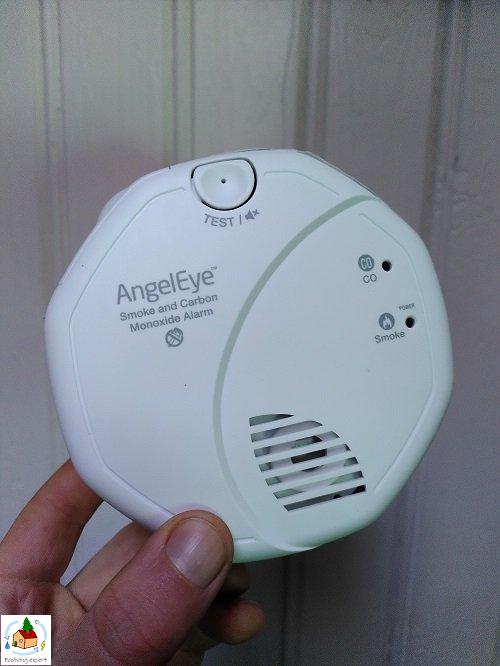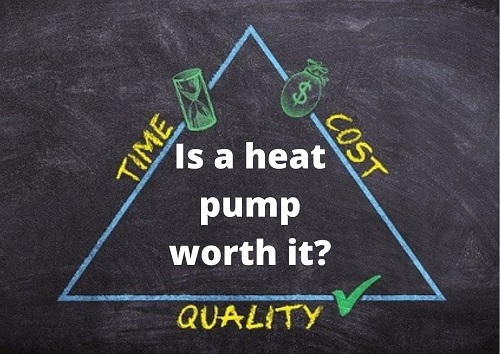A heat pump has many advantages over other heating systems. However, there are several aspects that should be considered before deciding on a heat pump. Therefore, this article answers the question: is a heat pump worth it? This question is answered by looking at all the costs associated with heat pumps, as well as health and safety aspects.
Considering costs, health, safety, and sustainability, a heat pump is worth purchasing over a gas furnace. A heat pump costs about the same as gas but does not pose a CO hazard, and does not emit CO2 when green electricity is used. However, a heat pump might not be fit for your home due to its low-temperature heating and requirements for insulation.
How to determine if a heat pump is worth it
Even though heat pumps are some of the more expensive heating systems on the market, there are many factors that determine if they are worth buying.
In this article, I will discuss the many factors that determine if a heat pump is worth buying over other heating systems. The following criteria will be taken into account:
- purchase costs
- installation costs
- energy use
- efficiency
- running costs
- life expectancy
- total yearly costs
- sustainability
- health and safety
- pros and cons of heat pumps
- available subsidies and grants
What does a heat pump cost compared to other heating systems?
A common air-source heat pump costs $7.400 to $16.000 while a high-efficiency ground-source heat pump costs $9.700 to $22.000. A gas furnace costs on average between $3,840 and $5,570, and an electric furnace costs between $2,000 and $5,500.
The average price of a heat pump is higher than a gas or electric furnace. Prices of heat pumps, however, vary greatly per type. Their price difference depends mostly on installation costs. For example, a ground-source heat pump extracts heat from deep ground layers or groundwater. For this, holes need to be drilled up to 400 feet deep. Therefore, the costs of installation are much higher than other heating systems.
The following table shows the cost ranges of the five different types of heat pumps.
| Type of heat pump (source) | Range of purchase cost (incl. installation) |
|---|---|
| Air | $7.400 to 16.000 (€6.500 to 14.000) |
| Ground (or groundwater) | $9.700 to 22.000 (€8.500 to 19.500) |
| Exhaust | $3.400 to 5.400 (€3.300 to 4.700) |
| Hybrid | $4.900 to 7.300 (€4.300 to 6.400) |
This table is based on information provided by the Dutch website Milieucentraal.nl. Milieucentraal is an initiative by the Dutch government to provide accurate information about, among others, how to improve the sustainability of our homes. The costs in this table are therefore based on data from the Netherlands.
I fully expect the prices for heat pumps to drop in the coming years due to increased demand as well as improvements in technology.
Explanation of types of heat pumps in the table
- An air-source heat pump extracts energy from the outside air
- A ground-source pump takes energy either from the ground or from groundwater
- An exhaust heat pump takes energy from outgoing air from your mechanical ventilation system
- Hybrid is a combination of a heat pump and another heating system such as a gas boiler
The costs of a gas- and electric furnace
Both a gas furnace and an electric furnace are cheaper than heat pumps. The average prices are:
- A gas furnace costs on average between $3,840 and $5,570 (source)
- An electric furnace costs between $2,000 and $5,500 (source)
As mentioned above, I expect heat pump prices to drop in the coming years. On top of that, government subsidies and grants might bridge the gap in price.

Subsidy is often available for heat pumps
Depending on the country you live in, subsidies may be present to stimulate the purchase of a heat pump. For the United States, a bill is being introduced that asks for a tax credit of 20% up to $800 (source). Currently, there is a small $300 tax credit available on energy star air-source heat pumps (source).
In the UK, grants are already available for heat pumps in the renewable heat incentive. You can find out how much subsidy you can get with this calculator: https://www.gov.uk/renewable-heat-incentive-calculator.
For Canada, several grants are available for heat pumps through the greener homes grant initiative. For example, $2500 to $5000 is available for air-source heat pumps. There is even a $600 grant available for home evaluation and expert advice. You can find out more at https://www.nrcan.gc.ca.
Efficiency: heat pump vs gas and electric
The main reason why heat pumps are up-and-coming heating systems is their efficiency. They can reach efficiencies far above what a gas or electric furnace can do. The efficiency of heat pumps normally ranges between 100% and a staggering 400%.
The following table shows the efficiencies of the different types of heat pumps versus a gas furnace and an electric furnace.
| Heating system | Efficiency | Explanation |
|---|---|---|
| Gas furnace | 80-95% | Exhaust for gases leads to heat loss |
| Electric furnace | 100% | No exhaust is required. 100% of energy goes to heating |
| Air-source heat pump | 100 – 400 % | The efficiency depends on the outdoor temperature |
| Ground (or groundwater) heat pump | 200 – 400 % | The heat source under ground never drops below freezing temperatures |
| Exhaust heat pump | 100+% | Extracts energy from mechanically ventilated air |
| Hybrid heat pump | 100+% | Switches between an air-source heat pump and central heating based on set preferences |
Energy use, running costs, and savings
Although heat pumps are more expensive to purchase and install, they will save money over time. The energy use of heat pumps is very low due to their high efficiency. Therefore, they will save on your energy bill despite the fact that electricity is about three times more expensive than gas.
The following table gives an indication of the energy use, running costs, and return on investment for each type of heat pump. The savings and return on investment are in comparison to using a gas furnace.
However, the information in this table is based on data from the Netherlands provided by the Dutch government initiative Milieucentraal.nl. Therefore, this information is only an indication of what you can expect. Energy prices differ significantly per country and region. So make sure to check your local prices for accurate costs for your specific situation.
| Type of heater | Energy use per year | Heat output | Efficiency | Running costs per year | Average savings per year (compared to gas) |
|---|---|---|---|---|---|
| Gas furnace | 1000 m³ gas | 16 – 30 kW | 80 – 95% | $1190*(€1.050) | N.A. |
| Electric furnace | 10.550 kWh | 15 kW | 100% | $1480 (€1.300) | N.A. |
| Air-source heat pump | 2.800 kWh | 3 – 12 kW | 100 – 400 % | $700 (€610) | $500** (€440) |
| Ground (or groundwater) heat pump | 2.100 kWh | 4 – 16 kW | 200 – 400 % | $525 (€460) | $675** (€590) |
| Exhaust heat pump | 800 m³ gas + 1.600 kWh | 10.55 kW | 100+% | $1.100 (€970) | $215 (€190) |
| Hybrid heat pump | 750 m³ gas + 1.600 kWh | 10.55 kW | 100+% | $1.100 (€960) | $230 (€200) |
*This includes costs for gas connection
**Savings are based on efficiency as well as not using the gas connection anymore.
Life expectancy, total yearly costs and return on investment
To get a better picture of the costs of a heat pump compared to a gas or electric furnace, we need to look into the life expectancy. This gives us a better indication of the actual yearly costs and the expected return on investment. The return on investment is based on how many years it takes for cost savings to earn back the difference in purchase cost.
The following table shows the life expectancy of each of the heating systems. If regular proper maintenance is done, a heating system’s life expectancy will increase.
| Heating system | Average life expectancy |
|---|---|
| Heat pump | 15 – 25 years |
| Gas furnace | 15 – 20 years |
| Electric furnace | 20 – 30 years |
Calculating the actual annual costs per system
To calculate the actual costs per year, we need to consider not only the purchase costs and annual savings but also the life expectancy of the system. Therefore, I have divided the average purchase costs of the heaters by their average life expectancy. On top of that, I added the yearly costs of running the system.
I have excluded any maintenance cots, assuming they are equal for all systems. After all, the main cost will be the hourly wage of the technician.
Keep in mind that these costs are based on averages and data from the Netherlands. For your specific situation, things can be quite different. However, this table hopefully serves as a useful indication of what you can expect to pay for the different heating systems.
| Heating system | Yearly costs |
|---|---|
| Gas furnace | $1460 |
| Electric furnace | $1630 |
| Air-source heat pump | $1285 |
| Ground-source heat pump | $1318 |
| Exhaust heat pump | $1245 |
| Hybrid heat pump | $1404 |
The yearly costs for heat pumps are all very similar. Therefore, I don’t think we can conclude that one heat pump is definitely cheaper than another. However, there is a large cost difference between heat pumps and gas or electric furnaces.
I think it is clear from this table that heat pumps are on average a little cheaper than gas or electric furnaces.
- A heat pump is on average $150/year cheaper than a gas furnace
- A heat pump is on average $315/year cheaper than an electric furnace
From only looking at the costs, this should be convincing enough to consider a heat pump. However, the costs for heating systems are not evenly spread across all their years of running. Purchase costs are the first costs we have to pay, and greatly determine if we can afford them at all. Therefore, choosing the cheapest option from the table above is not always the obvious choice.
Another way of looking at the costs is to look at the return on investment. The return on investment shows us how quickly the cheaper running costs can pay back the high purchase cost difference.
Return on investment: heat pump vs gas furnace
Finally, we need to take a look at the return on investment of purchasing a heat pump over a gas furnace. For this calculation, I have assumed that we are considering replacing our current gas furnace with a heat pump instead of a new gas furnace. Therefore, the return on investment is determined by how quickly the yearly savings pay for the difference in purchase costs.
| Type of heat pump (source) | Range of purchase cost (incl. installation) | Running costs per year | Average savings per year (compared to gas) | Return on investment |
|---|---|---|---|---|
| Gas furnace | $3,840 to $5,570 (€3.375 to €4.895) | $1190* (€1050) | N.A. | N.A. |
| Electric furnace | $2,000 to $5,500 (€1.758 to €4.834) | $1480 (€1300) | N.A. | N.A. |
| Air | $7.400 to 16.000 (€6.500 to €14.000) | $700 (€610) | $500** (€440) | 15 – 32 years |
| Ground (or groundwater) | $9.700 to 22.000 (€8.500 to €19.500) | $525 (€460) | $675** (€590) | 14,5 – 33 years |
| Exhaust | $3.400 to 5.400 (€3.300 to €4.700) | $1.100 (€970) | $215 (€190) | 17 – 25 years |
| Hybrid | $4.900 to 7.300 (€4.300 to €6.400) | $1.100 (€960) | $230 (€200) | 21,5 – 32 years |
*This includes costs for gas connection
**Savings are based on efficiency as well as not using the gas connection anymore
As can be seen in the table above, it takes a significant amount of years before the annual cost savings of a heat pump pay for their high purchase cost. The average return on investment from this table is just below 24 years. Therefore, the return on investment is a few years higher than their average life expectancy.
Because of this, we can conclude that based on costs a heat pump is about the same as a gas furnace.
Looking only at costs,
a heat pump performs the same as a gas furnace
Health and safety of heat pumps vs gas and electric furnace
Apart from costs, health and safety are important factors to consider in deciding if a heat pump is worth purchasing. Let’s take a look at the differences in health and safety aspects of heat pumps versus gas and electric furnaces.
Health effects of heating system: indoor air quality
A gas furnace always comes with some health and safety hazards, no matter how modern and well-maintained it is. Due to burning fuel, a gas furnace emits gasses. These can pose a hazard in several ways:
- Carbon monoxide (CO): an extremely hazardous gas that demands constant CO monitoring
- Fine dust/particulate matter (pm2.5): tiny particles are released when burning fuel. These particles can penetrate our lungs and cause damage
For both an electric furnace and heat pumps, these hazards are not present since they run on electricity and don’t burn any fuel.

Indoor air quality is a topic I am passionate about and cover in-depth on this website. If you are interested in reading more about indoor air quality, I recommend reading my article: The complete guide to indoor air quality. It covers what causes poor air quality, its effects on our health, and what you can do to maintain good air quality.
Safety: heat pump vs gas furnace
Gas heaters do pose some fire hazards because they are burning gas and there is literally fire inside the heater. However, you can be sure any gas heater on the market has been thoroughly tested for safety. Therefore, when used properly according to the provided safety instructions, you should be fine. Make sure to maintain the heater so it is in good condition.
Heat pumps use electricity to move around a liquid and compress it. This is a very safe process that does not become very hot. Simply put, a heat pump does not produce any heat but transfers it from its source (air, ground, water, or exhaust heat) to your room. On top of that, they produce relatively low-temperature heating compared to a gas or electric furnace.
On top of that, a gas leak is always a potential hazard for a gas furnace. Heat pumps do not have this issue.
A heat pump is very safe, about as safe as a fridge
Sustainability: heat pump vs gas furnace
Heat pumps are more sustainable than gas furnaces. They do not burn fossil fuels and therefore do not emit CO2 when green electricity is used. A heat pump’s energy use is very low as they are 100 to 400% efficient compared to a gas furnace’s maximum efficiency of 95%.
Subsidies and grants are often available for heat pumps because of their sustainability. Heat pumps are very efficient and therefore use very little energy. on top of that, they run on electricity, which can be produced fully sustainably. For example, solar panels on your roof could provide the electricity to run the heat pump. Otherwise, choosing a green electricity provider also does the job.
Gas furnaces, on the other hand, burn natural gas to provide their heating. This leads to CO2 emissions as well as being a non-renewable resource.
Disadvantages of heat pumps
As we have seen, a heat pump generally costs about the same as a gas furnace. Additionally, they are a bit safer and healthier. However, a heat pump works a little differently than a typical furnace. Therefore, the following difference might be a disadvantage depending on your situation:
- Heat pumps require a well-insulated home because they provide low-temperature heating
- Because of low-temperature heating, heating might take more time
- A heat pump’s efficiency declines with the temperature of the extraction source
These are the main difference between traditional heating systems and a heat pump. Depending on your situation, these factors could influence the decision of installing a heat pump.
There are, of course, some advantages to heat pumps too.
Advantages of heat pumps
Although some aspects of heat pumps might be a disadvantage in your situation, other aspects might be of great advantage.
Air-source heat pumps can function as air conditioners
An air-source heat pump works by bringing heat from the outdoor air inside. This process can be reversed. Because of this, an air-source heat pump can be used as an air conditioner. In this way, you might be able to save money if you were considering installing an air conditioner next to a heating system.
Low-temperature heating is ideal for floor heating
Low-temperature heating is a disadvantage if your house is poorly insulated. However, it is ideal for floor and wall-based heating systems. They run at lower temperatures because they have a much larger surface area than radiators. Therefore, the heat exchange is much more effective, and lower temperatures are required to heat the room.
Heat pumps can be used to dehumidify the air
Some heat pumps have a ‘dry’ mode. This mode can be turned on when the desired room temperature is reached to then lower start dehumidifying. In this mode, the heat pump continuously switches between heating and cooling to maintain temperature. (source)
If you would like to read more about the pros and cons of heat pumps, I recommend reading my article: Heat pumps pros and cons.
Conclusions: heat pumps are worth it
Looking at costs as well as health and safety, heat pumps are definitely worth it. Although they are not necessarily cheaper than a gas furnace, in the long run, they are not more expensive. Therefore, considering their health and safety benefits as well as being a huge upgrade in terms of sustainability, they are definitely worth it.
- Heat pumps cost similarly to gas furnaces
- Heat pumps are a little safer
- Heat pumps do not emit air pollutants
- Heat pumps are very sustainable:
- they use very little energy
- they run on electricity, which can be sourced sustainably
To determine whether a heat pump is right for you, make sure to consider all the pros and cons of heat pumps. Additionally, for such a big investment, consider contacting an expert. An expert from a heat pump retailer can help determine if your home is suited for a heat pump and advise which heat pump is best for you.

